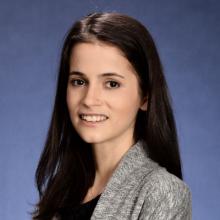Talia Morstead
Why did you decide to pursue a graduate degree?
As someone who loves learning and being exposed to new ideas, pursuing a career in research or academia has always intrigued me. I have also always had a keen interest in psychology and in particular, how individuals interpret and react to stressful events in diverse, complex, and often contradictory ways. Being exposed to health psychology research during my undergraduate degree solidified my interest in this area, and motivated me to pursue graduate work in the field.
Why did you decide to study at UBC?
My decision to study at UBC was driven in large part by my desire to work with Dr. Anita DeLongis, a foremost expert in the field of stress and coping. After coming across Dr. DeLongis’ work during my undergraduate studies and having the opportunity to volunteer in her lab, I saw that our research interests were closely aligned and felt that she would be an excellent mentor.
What is it specifically, that your program offers, that attracted you?
The opportunity to specialize in health psychology as well as the research-intensive and mentorship-based training that characterize both the MA and PhD programs was what attracted me to the UBC psychology department.
What was the best surprise about UBC or life in Vancouver?
Pacific Spirit Regional Park surrounds the UBC Vancouver campus and is truly incredible. Despite having been born and raised in Vancouver, I never took full advantage of the trails until becoming a UBC student and spending more time on campus. As an added bonus, many of the trails are off-leash – a feature of the UBC campus my Vizsla, Olive, is a particular fan of.
What aspects of your life or career before now have best prepared you for your UBC graduate program?
Obtaining research experience during my undergraduate degree was critical to solidifying my interest in my intended topic of research and adequately preparing me for my graduate program. Being exposed to every step of the research pipeline as an undergraduate student allowed me to choose courses and pursue extracurricular training outside of my program of study (e.g., statistical techniques, coding, metascience etc.) that would ultimately be of benefit to me once I began graduate school.
What advice do you have for new graduate students?
My primary advice for new graduate students is to approach all areas of inquiry with an open mind, and prioritize engaging with an array of diverse ideas and perspectives. Graduate school is an amazing opportunity to obtain valuable training, while actively contributing to the corpus of knowledge within one’s field. In my view, cultivating an inquisitive mindset is crucial to getting the most out of the journey. It also helps to get a puppy (for myself at least, your mileage may vary).

